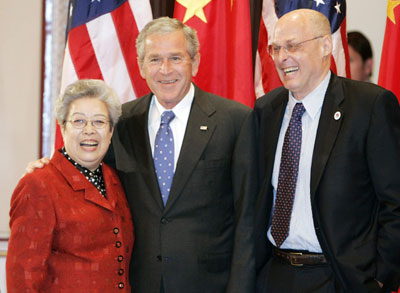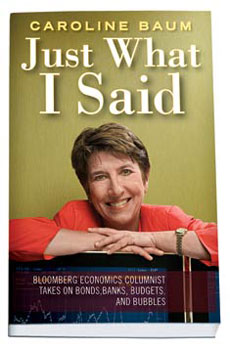China not a manipulator, US Congress is: Opinion
By Caroline Baum (Bloomberg)Updated: 2007-06-19 08:25
(Caroline Baum, author of "Just What I Said," is a columnist for Bloomberg News. The opinions expressed are her own)
 U.S. President George W. Bush (C) and U.S. Secretary of Treasury Henry Paulson (R) welcome Chinese Vice Premier Wu Yi to the Eisenhower Executive Office Building in the White House complex before a meeting of the U.S.-China Strategic Economic Dialogue in Washington, May 24, 2007. [Reuters] |
China may not qualify as a currency manipulator, according to the terms set out in Section 304 of the Omnibus Trade and Competitiveness Act of 1988. Not to worry: The U.S. Congress is happy to fill those shoes.
In its semiannual report on International and Exchange Rate Policies last week, the U.S. Treasury declined to tag China, which manages its currency, the yuan, to the dollar, with a scarlet "M."
"Treasury was unable to determine that China's exchange rate policy was carried out for the purpose of preventing effective balance of payments adjustment or gaining unfair competitive advantage in international trade," according to the report.
 |
On the same day that Treasury was punting on name calling -- preferring, instead, a Strategic Economic Dialogue between the two countries -- four U.S. senators picked up the ball, introducing legislation that would make it easier for American companies to seek redress under anti-dumping laws.
"For too long our currency policy has left American workers and businesses unprotected from foreign governments seeking an unfair financial advantage," said Senate Finance Committee Chairman Max Baucus, Democrat of Montana, one of the bill's sponsors.
In case the good senator hasn't noticed in his 32 years in Congress, the U.S. has no currency policy. And as for getting China to adopt a more flexible exchange rate, anything Congress does will probably be counterproductive. Sovereign nations don't like to be seen caving in to pressure from other countries.
Win-Win Situation
"What country has changed as much as China in the last 30 years in terms of opening its markets?" said Dan Griswold, director of the Cato Institute's Center for Trade Policy Studies in Washington. "And how much has the U.S. benefited? The whole debate is based on a false notion of mercantilism. You can't realize real gains through currency manipulation."
In the Asian financial crisis in 1997, "some currencies practically dropped 40 percent overnight," Griswold said. "It didn't create prosperity."
China was singled out and praised for maintaining its peg to the U.S. dollar.
Two of the other sponsors of the Currency Exchange Rate Oversight bill, Republican Lindsey Graham of South Carolina and Democrat Chuck Schumer of New York, are back for their second China go-round. Last year, the duo sponsored legislation that would have slapped tariffs of 27.5 percent on Chinese imports. They withdrew the bill when it became clear that it wasn't compliant with World Trade Organization rules.
Strong-Arm Tactics
"Our previous legislation got China's attention," Schumer boasted at a June 13 press conference. "The purpose of this legislation is to require them to change."
Schumer's "elegant solution" to the China conundrum involves identifying "fundamentally misaligned currencies" for "priority action" in 180 and 360 days if the misaligned country fails to adopt "appropriate policies" to realign itself. The final step would require the Treasury and Federal Reserve Board to consult with other central banks and consider "remedial intervention in currency markets."
As a practical matter, how would that work? Schumer's elegant solution seems to have some inelegant operational difficulties. For example, how exactly would the Fed sell dollars and buy yuan, a currency that isn't freely traded in the open market?
Policy or Politics?
Graham's protectionist motivations derive from the fact that South Carolina competes, so to speak, with China in textile and apparel manufacturing. At the top echelons of that competition is billionaire Roger Milliken, head of a multinational textile empire based in Spartanburg and a major Graham supporter. It wouldn't be a huge leap to assume a connection between Milliken's contributions and Graham's trade positions.
Critics of China's currency-management policy claim the yuan is undervalued by as much as 40 percent, giving the country's exports a competitive advantage.
You never hear much about the disadvantages, about China paying artificially inflated prices for the capital goods and intermediate materials it imports. It overpays for vast amounts of raw materials, everything from oil to copper to steel.
At the same time, do American consumers want to pay 40 percent more for underwear and other low-end apparel from China? (China's lost market share would be other emerging countries' gain, but it would still mean higher import prices for Americans.)
League of Its Own
China still has a long way to go to reform its domestic financial system and move from a managed to a flexible exchange rate. Because it lacks developed capital markets and a monetary policy of its own, China has to resort to various administrative measures to manage its booming economy.
The People's Bank of China raised its one-year benchmark rate by 100 basis points in the last two years, hardly an onerous increase in an economy that continues to barrel ahead at 11 percent. It increased reserve requirements five times this year.
In addition, China cut tax breaks for exporters, imposed limits on real-estate investment and land use, implemented environmental controls and tripled the stock transfer tax.
Change doesn't happen overnight, especially in a country impoverished by decades of state control of the economy. Congress seems to have run out of time.
Schumer said there's broad bipartisan support for the currency bill in the House and the Senate, and he expects it to pass with a veto-proof majority.
"A large number of people in both parties got the China issue wrong," Griswold said. "To intentionally weaken the dollar to gain some illusory trade advantage is a fool's errand."
Now there's a challenge Congress won't be able to resist.
(Special courtesy to Bloomberg News)
|
||
|
||
|
|